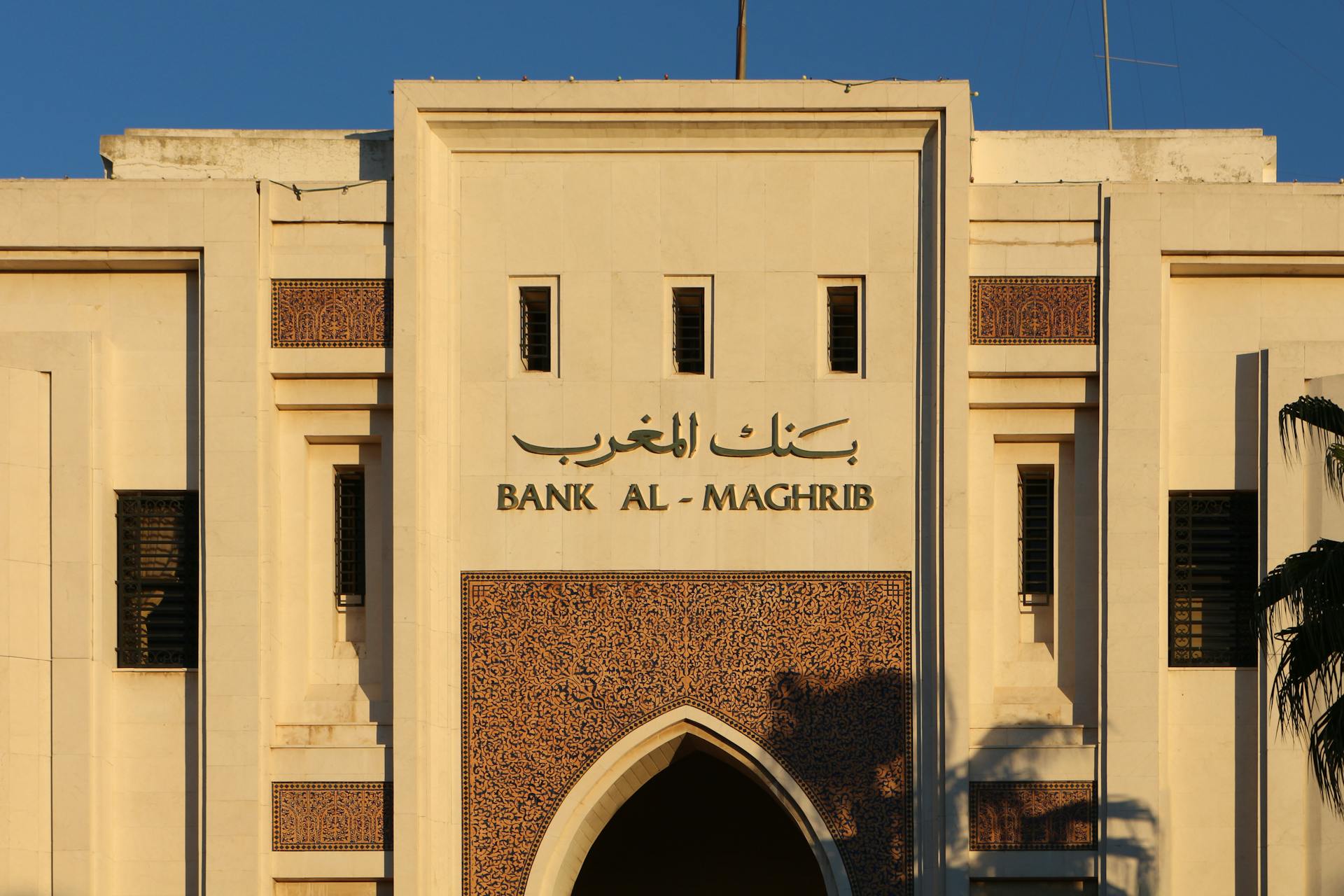
The Bank of Mauritius is the central bank of Mauritius, responsible for maintaining the stability of the country's financial system. It was established in 1967.
The Bank's operations are guided by the Bank of Mauritius Act 1966, which outlines its objectives and powers. The Act aims to promote the economic and financial stability of Mauritius.
The Bank of Mauritius plays a crucial role in regulating and supervising the banking sector in Mauritius. It sets and enforces banking regulations to ensure the safety and soundness of banks.
The Bank also issues currency and coins in Mauritius, as well as manages the country's foreign exchange.
You might like: Banking Act 1979
History of Bank of Mauritius
The Bank of Mauritius has a rich and complex history that spans over two centuries. The first Bank of Mauritius started operations in 1813 but unfortunately ceased business in 1825.
Three separate commercial banks operated under the Bank of Mauritius name in the 19th Century. The second Bank of Mauritius began operations in 1832 and favored the interests of the planter class.
Take a look at this: Regulate the Operations and Compliance of Health Insurance Companies

The financial crisis of 1847 in London led to severe losses for both of Mauritius's banks, resulting in the Bank of Mauritius ceasing business in 1848.
A third Bank of Mauritius was established in 1894 to take over the local business of the failed New Oriental Bank Corporation. This bank opened a branch in the Seychelles in 1911.
In 1916, the Mercantile Bank of India acquired the bank, and in 1959, HSBC acquired the Mercantile Bank.
Curious to learn more? Check out: Philippine Business Bank
Bank Operations
The Bank of Mauritius plays a crucial role in the country's financial system, and understanding its operations is essential for anyone looking to navigate the banking landscape.
The bank's primary function is to conduct monetary policy and manage the exchange rate of the rupee. This involves taking into account the orderly and balanced economic development of Mauritius.
One of the key areas where the Bank of Mauritius shines is in regulating and supervising financial institutions. This includes banks, non-bank deposit taking institutions, money changers, and foreign exchange dealers.

The bank also oversees the payment systems, clearing houses, and the issuance and quality of payment instruments. This is crucial for ensuring the smooth flow of money in and out of the country.
The Bank of Mauritius manages the foreign exchange reserves of Mauritius, which is a vital component of the country's economic stability.
In addition to these responsibilities, the bank collects, compiles, and disseminates monetary and related financial statistics on a timely basis. This helps the government and other stakeholders make informed decisions about the economy.
The bank issues currency, acting as a central authority in the financial system.
The Bank of Mauritius also acts as banker and adviser on monetary and financial matters to the government. This provides valuable guidance and support to policymakers.
The bank adopts policies to safeguard the rights and interests of depositors and creditors of financial institutions. This is a critical function that helps maintain trust in the banking system.
The bank monitors system-wide factors that have the potential to impact negatively on the financial conditions of financial institutions. This proactive approach helps prevent potential problems from arising.
The Bank of Mauritius promotes public understanding of the financial system, which is essential for building a well-informed and financially literate community.
Lastly, the bank maintains a Credit Information Bureau, which provides valuable insights into the creditworthiness of individuals and businesses.
Broaden your view: Problems with Td Bank Banking Payment System Complaints
Regulation and Oversight
The Bank of Mauritius is responsible for regulating and supervising financial institutions in Mauritius. The Banking Act 2004 is the enabling legislation for this purpose.
The Bank of Mauritius issues licences to banks, Islamic banks, private banks, and specialized financial institutions to carry on their respective businesses. Since 2015, the Bank can also issue licences to specialized financial institutions that facilitate economic development in Mauritius.
The Banking Act 2004 incorporates various aspects of financial institutions, including licensing, capital structure, financial statements, supervision, and electronic banking. The Act also covers the administration of financial institutions, the role of external auditors, and the limitation on operations.
The Bank of Mauritius also has a role in safeguarding the internal and external value of the currency of Mauritius and promoting the orderly and balanced economic development of the country.
Explore further: Arab Bank for Economic Development in Africa
Currency Security
The Bank of Mauritius plays a crucial role in safeguarding the value of the currency of Mauritius.

Established in 1967, the Bank of Mauritius is the central bank of Mauritius, serving to safeguard the internal and external value of the currency of Mauritius and its internal convertibility.
Its primary objective is to maintain price stability and promote the orderly and balanced economic development of Mauritius, as stated in the Bank of Mauritius Act 2004.
The Bank of Mauritius is responsible for formulating and executing monetary policy consistent with stable price conditions, with the help of a Monetary Policy Committee.
This committee, chaired by the Governor, plays a key role in determining the monetary policy of the Bank of Mauritius.
The Bank of Mauritius is an independent institution, with its Board not subject to the direction or control of any other person or authority.
It is also committed to transparency in its operations, acting equitably and uniformly in accordance with sound administrative principles.
If this caught your attention, see: King Price Insurance
Regulation and Supervision
Regulation and Supervision is a crucial aspect of maintaining a sound banking system in Mauritius. The Banking Act 2004 is the enabling legislation for all financial institutions under the Bank of Mauritius' purview.
The Act's basic objectives are to protect the interests of depositors and creditors, and to maintain a sound banking system. This is achieved through the licensing of banks and other financial institutions, which is a key aspect of the Act.
The Bank of Mauritius issues licences to banks wishing to carry on banking business, Islamic banking business, and private banking. Since May 2015, the Bank can also issue a specialised financial institution licence to a body corporate facilitating the economic development of Mauritius.
The Banking Act 2004 incorporates various aspects relating to financial institutions, including licensing, capital structure, financial statements, and electronic banking. These aspects are essential for maintaining a stable and secure banking system.
Here are some of the key aspects of the Banking Act 2004:
- Licensing of banks and other financial institutions
- Capital structure and requirements
- Financial statements, audit, and supervision
- Responsibilities of directors and other officers
- Electronic banking
- Administration of financial institutions
- Role of external auditors
- Limitation on operations
- Conservatorship, voluntary, and compulsory liquidation of financial institutions
- Establishment of a Deposit Insurance Scheme
- Issuance of guidelines to financial institutions
These measures help ensure that financial institutions operate in a safe and sound manner, protecting the interests of depositors and creditors.
Special Initiatives
The Bank of Mauritius has been actively involved in various special initiatives to promote financial inclusion and stability in the country.
One notable initiative is the introduction of the Bank's Microfinance Unit, which aims to provide financial services to low-income households and small businesses.
The Bank of Mauritius has also implemented a system to monitor and manage systemic risk, ensuring the stability of the financial system.
This is achieved through the Bank's Financial Stability Unit, which identifies and assesses potential risks to the financial system.
The Bank has also taken steps to enhance the resilience of the financial system by improving the country's risk management framework.
The Bank of Mauritius has also been working on a project to develop a financial inclusion strategy, which aims to increase access to financial services for the underbanked population.
This initiative is expected to have a positive impact on the country's economic growth and development.
The Bank has also introduced a number of measures to promote financial literacy and awareness among the public.
These initiatives are a testament to the Bank's commitment to promoting financial stability and inclusion in Mauritius.
See what others are reading: In a Fractional Reserve Banking System Banks Create Money Because
Featured Images: pexels.com


